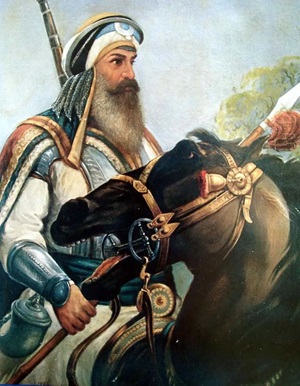Feb 08, 2026
Feb 08, 2026
Baba Baghel Singh & The Legacy of The Sikh Triumph Over Delhi
Do you ever stop to wonder about the history etched in the names of the places you pass by every day? How often do we look beyond the hustle and bustle of our daily lives to delve into the stories that shaped our land, our culture, and our identity? If you've ever been to Delhi, you might be familiar with places like Mori Gate, Tees Hazari, Mithai Pul, and Moti Bagh. But do you know the saga of bravery, valor, and faith that lies behind these names? Allow me to take you on a journey back to 1783, to a chapter of Indian history that is as profound as it is often overlooked.
The Conqueror from the North: Baba Baghel Singh
 Born in the 1730s in village Jhabal Kalan, Amritsar, Baghel Singh grew up in the shadow of the mighty Mughal Empire. His forefathers, followers of Guru Arjan Sahib since the 1580s, had instilled in him a devotion to the Sikh faith and an unbreakable spirit of resistance.
Born in the 1730s in village Jhabal Kalan, Amritsar, Baghel Singh grew up in the shadow of the mighty Mughal Empire. His forefathers, followers of Guru Arjan Sahib since the 1580s, had instilled in him a devotion to the Sikh faith and an unbreakable spirit of resistance.
In 1783, as the Mughal Empire waned, Baba Baghel Singh saw an opportunity to reclaim what had been lost, to stand up against forceful religious conversions, and to etch the memory of the Sikhs into the heart of Delhi.
The March to Delhi: A Triumph of Strategy and Faith
On the fateful day of 11th March 1783, the Sikh army, led by Baba Baghel Singh, marched into Delhi, their sights set on the Red Fort. Their path was fraught with obstacles, but their faith and determination were unshakable.
The Mughal emperor, Shah Alam II, had ordered the gates of the Red Fort to be sealed, especially those leading to the rations. But fate, it seems, had other plans. A chance encounter with a mason revealed a weak spot in the fort's wall, and the Sikhs seized the opportunity. With logs of wood, they breached the wall, and the place where they entered is now known as Mori Gate.
The Sikhs had triumphed, and the sweets they distributed to celebrate their victory are remembered today in the name Mithai Pul.
The Treaty & the Legacy
Emperor Shah Alam II, recognizing the strength and determination of the Sikhs, offered a treaty. The Sikhs were granted the right to construct Gurudwaras on historical sites, including Gurudwara Sis Ganj Sahib, Gurudwara Rakab Ganj Sahib, Gurudwara Bangla Sahib, and others.
The place where Baba Baghel Singh halted with his 30,000 men is now known as Tees Hazari, a living testament to the numerical strength of the Sikhs during their conquest of Delhi.
A Forgotten Chapter?
The history of the Sikhs, their courage, and their resistance to oppression is a tale that resonates with the ethos of India. Yet, this chapter of history is often relegated to the shadows, overshadowed by the narrative of the Mughal rule.
Why has this glorious history been obscured? Why are the stories of the Sikhs, their victories, and their sacrifices not more prominently featured in our national consciousness? Is it merely an oversight, or is there a deeper reason behind this historical neglect?
As we walk through the streets of Delhi, let us remember the echoes of the past that resonate in the very names of the places we traverse. Let us honor our heroes and ensure that their legacy is not forgotten.
The tale of Baba Baghel Singh and the Sikh conquest of Delhi is not just a historical anecdote; it's a symbol of resistance, faith, and the indomitable spirit of a people. Are we ready to embrace this legacy, to learn from it, and to carry it forward into our future? The answers lie within us, waiting to be unearthed, pondered, and cherished.
Image courtesy Sikh Museum Initiative
28-Oct-2023
More by : P. Mohan Chandran

|
Many thanks for shinning the light on one of the glossed over chapter from our history. Our school children's history books and other history books are full of such glaring omissions.You have a very valid question. Quote: "Is it merely an oversight, or is there a deeper reason behind this historical neglect?" We all need to reflect on these aspects, so that from childhood we have learnt the history that can make us feel proud of our ancestors and also get inspired by their acts of bravery. |